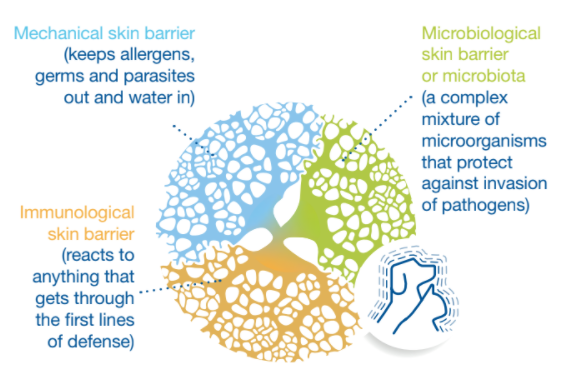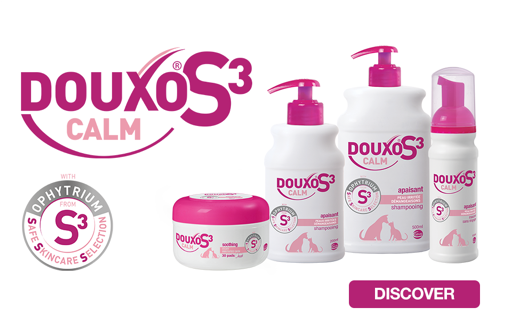Thump, thump, thump, thump, thump! There goes that leg again. Champ, champ, champ, there goes your dog again biting at their paws. They have been at it for days. Their skin is inflamed, red, and seems to be maddeningly itchy. You can tell there are miserable and it is time to do something about it.
Get to the root of the problem
When you find yourself in this situation, the first thing to do is schedule a visit with your vet to find out what underlying reason is causing them to itch. Your vet will likely perform a thorough clinical examination and ask for a detailed history about your pet’s diet, medical history and parasite control. They may also want to run a few tests to try and narrow down what might be causing the issue.
- Checking for fleas, ticks and other parasites: Are you up to date with your parasite control? A single bite can trigger an allergic reaction in highly sensitive dogs, so it’s very important to rule out this possibility.
- Ruling out yeast and bacterial infections.
- Seeing if your pet has a contact allergy and has been exposed to something that may have irritated the skin such as cleaning products, new fabrics or bedding or even plants in the garden.
- Evaluating whether your pet’s food could be causing a cutaneous adverse food reaction.
- Determining if there may be an environmental trigger causing your pet to itch such as dust mites or pollen. Your vet may ask if your pet’s skin is bad at particular times of year to get a better understanding of what environmental allergens may be triggering these clinical signs. Some vet’s may want to perform a blood test to check if your pet is allergic to common environmental allergens.
After these investigations have been performed your vet should have a better idea of what may be causing your pet to scratch and itch so much and be able to advise on a suitable treatment path.
So your dog has allergic skin disease, now what?
In the best case scenario, the offender will have been identified and can be effectively removed from your dog’s environment. This can be easily achieved when the trigger is something like external parasites by using regular preventative treatments.
If your vet is suspicious of a food allergy they will often advise a diet trial using a novel constituent or exclusion diet. Chicken and fish are common culprits when it comes to food allergies.
Many dogs suffer from a condition called atopic dermatitis which is a complex condition typically caused by a combination of factors, to include: irregularities in the permeability of the skin barrier; dysregulation of the immune system, genetics and hypersensitivities to environmental allergens. Unfortunately, this is a common outcome (around 10-15% of dogs) and your dog will require a long-term, multi-modal treatment regime for this condition.
How to treat dog skin allergies
Let’s explore some of the options available. Keep in mind that a combination of treatments are often required to manage dogs with itchy skin and often therapy has to be monitored and adjusted over time.
Environmental changes to limit contact with allergens
Tackling dust mites and mould can be a real challenge but some simple steps such as regularly hoovering and cleaning any bedding that your pet sleeps on using hypoallergenic detergents can really help.
Effective flea control
If you own a dog with skin allergies, you should be especially vigilant to ensure that their preventative flea treatments are kept up to date. Flea bites are a common trigger for pets with skin allergies and will detrimentally contribute to increasing levels of itching and inflammation.
Topical Shampoos and Mousses
Topical formulations can help reduce flares and support your pet’s skin. Dogs with skin allergies will have a damaged skin barrier. The skin barrier is made up of three complementary systems; microbiological, mechanical and immunological, that work in harmony to keep your skin healthy and resistant to external allergens.

Topical products are essential when trying to manage irritated skin and maintain a healthy skin barrier as they bring restorative ingredients directly to where they are needed most. A variety of formulations are available for topical application, such as, shampoos, mousses, pads and sprays; giving pet owners practical and easy application options.
Immunomodulatory therapy
Your vet may prescribe your dog an oral or injectable medication to help alleviate their immediate symptoms and prevent relapses.These medications suppress parts of the immune system that cause inflammation and subsequently itching. Such medications include corticosteroids, antihistamines and drugs that work more specifically on the itch pathways. These products can be very effective in managing allergic skin disease but they can vary greatly in cost, efficacy and their potential to cause side effects. It is best to discuss what systemic treatment options would best suit your pet with your vet.
Immunomodulatory vaccines
These can be used when the triggering allergen(s) have been identified on a blood panel. An allergy vaccine is then produced that is specific to your dog’s allergic profile. These vaccines are given according to a specified regime and contain a small element of the allergen to trigger the dog’s immune system to build up tolerance to that environmental trigger. It can take approximately 10-12 months to see results from this treatment so don’t be discouraged if you don’t see immediate results. This treatment has to be continued lifelong.
Other complementary treatments
Your vet may suggest other supplements such as essential fatty acids which are typically given orally.
A word of caution
Getting your furry friend comfortable again is bound to take some trial and error, so don’t be discouraged if something doesn’t work. Just keep trying new things and combinations of things until you and your vet find what works.
Finally, bear in mind that allergies can change over time, with the seasons and as the animal gets older. A treatment regime that was working can suddenly stop being effective and your dog’s allergies could flare up again. If this happens, don’t worry! This is normal and just means that the treatment plan needs to be readjusted. Patience and perseverance are key!
DOUXOⓇ S3 CALM - for itchy, sensitive or irritated skin
DOUXOⓇ S3 CALM helps to support and rebuild the skin barrier in pets with sensitive and irritated skin. It has a soothing effect on the skin and it helps to make it more supple and hydrated. This product has proven performance on all 3 skin barriers (mechanical, immune system and microbiological - bacteria on the skin). It also has been shown to be well tolerated on both normal and irritated skin.



